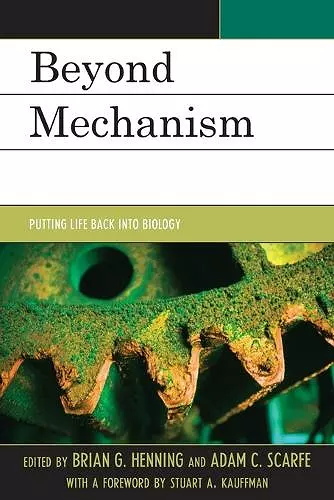Beyond Mechanism
Putting Life Back Into Biology
Brian G Henning author Adam Scarfe author
Format:Paperback
Publisher:Lexington Books
Published:25th Feb '15
Currently unavailable, and unfortunately no date known when it will be back

It has been said that new discoveries and developments in the human, social, and natural sciences hang “in the air” (Bowler, 1983; 2008) prior to their consummation. While neo-Darwinist biology has been powerfully served by its mechanistic metaphysic and a reductionist methodology in which living organisms are considered machines, many of the chapters in this volume place this paradigm into question. Pairing scientists and philosophers together, this volume explores what might be termed “the New Frontiers” of biology, namely contemporary areas of research that appear to call an updating, a supplementation, or a relaxation of some of the main tenets of the Modern Synthesis. Such areas of investigation include: Emergence Theory, Systems Biology, Biosemiotics, Homeostasis, Symbiogenesis, Niche Construction, the Theory of Organic Selection (also known as “the Baldwin Effect”), Self-Organization and Teleodynamics, as well as Epigenetics. Most of the chapters in this book offer critical reflections on the neo-Darwinist outlook and work to promote a novel synthesis that is open to a greater degree of inclusivity as well as to a more holistic orientation in the biological sciences.
A wonderful volume edited by Brian Henning and Adam Scarfe. . . .the book provides many helpful intuitions, and also arguments and explanations, towards the understanding of. . . .life itself. . . .The work by Brian Henning and Adam Scarfe deserves much appreciation. * Biosemiotics *
This is a remarkable book that comes at a timely moment, both for theoretical biology and for the philosophy of biology. . . .Beyond Mechanism not only presents a wide repertoire of arguments in defense of a more pluralistic view of evolution, but more importantly, it constitutes a piece of research into a new conceptual framework for biology. . . .Globally speaking, the set of chapters in this book constitute an excellent, profound and very comprehensive criticism of the reductionist traditions in biology, and a fascinating exploration of new alternatives. * Science & Education *
Suspicion about the adequacy of mechanistic views of nature has lately become increasingly audible. Contributors to this uniformly excellent body of essays not only amplify this suspicion but they also offer scientifically and intellectually sophisticated alternatives. I consider this book essential reading for anyone seriously interested in understanding biology in its relationship to other fields of scientific and philosophical inquiry. -- John F. Haught, Georgetown University
This collection of papers explores some ways forward for biological science, out of its neo-Darwinian stasis and its mechanistic bonds. Perspectives brought to bear on this project herein range from ontogeny to ecology, entrained by a renewed bio-philosophy, and influenced as well by semiotics and moral considerability. The contributors include biologists and philosophers as well as a theologian. Major influences from the past are Aristotle, Kant, Lloyd Morgan and Whitehead, among more recent ones like Justus Buchler and Waddington. Anti-mechanicism is the overall organizing theme, as suggested by the phenomena of emergence and complexity, and mediated by concepts like self-organization and finality. Bacon’s prohibition against final cause serving as a motivation within scientific models is finally being jettisoned. Special topics include: adaptive state space, agency, anticipation, autonomy, epigenetics, hierarchical structures, interpretation, niche construction, organic selection, performativity, process philosophy, and symbiogenesis. Structural attractors are hinted at in regard to extension outward of relevant environments. There is a bit of internal criticism, as well as a muted demurrer by an observer from the current establishment. I recommend this volume to those willing to consider some of the possibilities emerging now within biological science. -- Stanley N. Salthe, Binghamton University
ISBN: 9781498511223
Dimensions: 229mm x 155mm x 29mm
Weight: 767g
484 pages